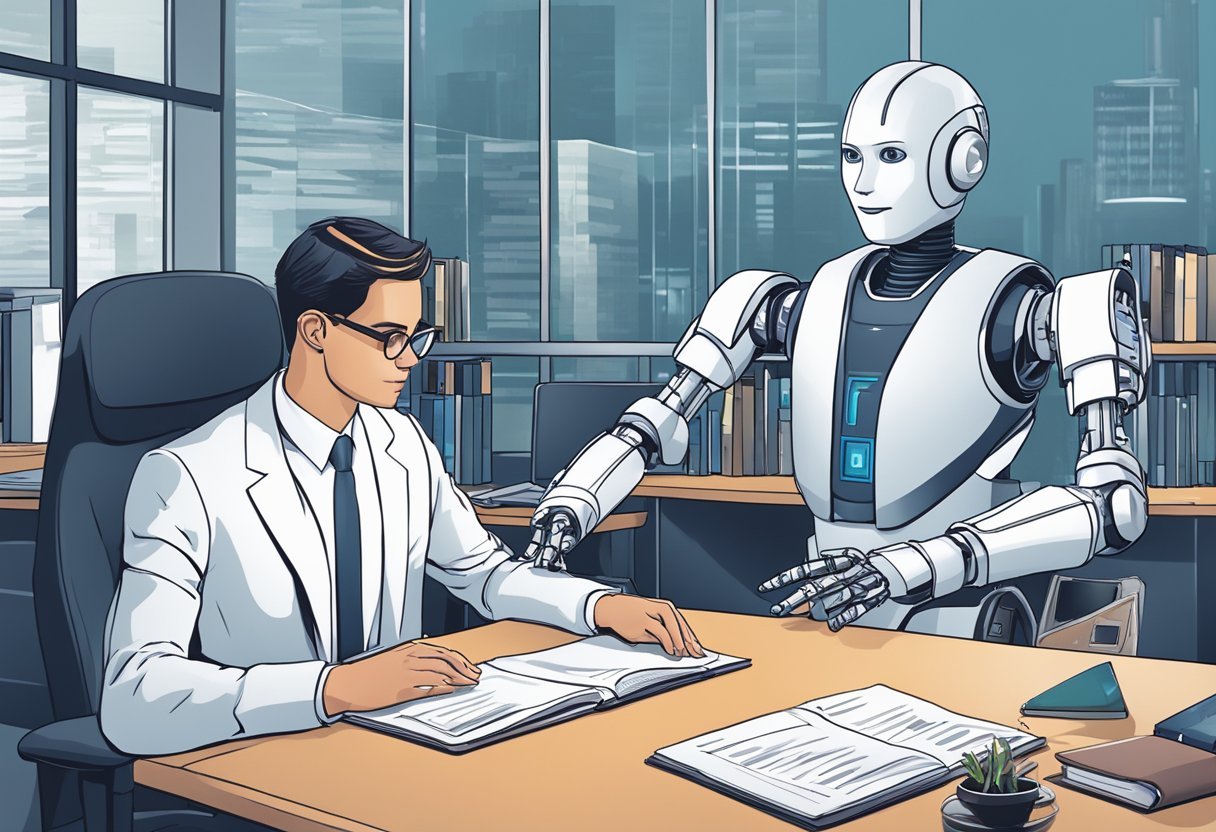Will AI Replace Accountants: Exploring the Future of Financial Services
Artificial intelligence is revolutionizing many industries, and accounting is no exception. The question on everyone’s mind is whether AI will fully replace accountants or simply change how they work. AI will not replace accountants completely; instead, it will enhance their roles by taking over repetitive and mundane tasks, allowing them to focus on more strategic activities. This technology is transforming data analysis and automation, making accounting more efficient.

Despite AI’s advancements, the human touch remains essential in accounting. Tasks requiring ethical judgment and decision-making cannot be easily replicated by machines. Major firms agree the need for human expertise persists, as accountants adapt and integrate AI into their work. To stay relevant, accountants are learning to work alongside AI, using it to deliver more value to clients.
Key Takeaways
- AI enhances, not replaces, accountant roles.
- Technology reduces repetitive tasks, freeing accountants for strategic work.
- Human judgment is crucial for ethical decisions in accounting.
The Evolving Role of Accountants

In the age of AI, accountants see their roles transforming significantly. AI takes over routine tasks, enabling accountants to focus on strategic activities and decision-making processes. Technology enhances accuracy and efficiency, driving substantial changes in how accounting tasks are completed.
Impact of AI on Accounting Practices
AI is revolutionizing accounting by performing repetitive tasks quickly and accurately. It handles large datasets, offering precise analytics and insights that human accountants would take much longer to generate. With these tools, firms benefit from improved accuracy and operational efficiency.
Accountants now leverage AI to streamline activities such as data entry, audits, and tax preparation. Processes that were once tedious are now automated, freeing accountants from mundane tasks. Additionally, AI assists in enhancing forecast abilities, supporting more informed and strategic decisions.
Accountants’ Adaptation to Technological Changes
Accountants are embracing this transformation by adopting new skills and focusing on value-driven activities. They are learning to interpret AI-generated data to provide strategic advice to clients. This shift emphasizes the importance of human judgment, creativity, and relational skills in accounting practices.
To remain competitive, accountants are engaging in continuous learning to understand new technologies and their implications. They are also finding ways to integrate AI tools into their workflows, ensuring they remain relevant in a rapidly evolving landscape. This adaptability positions accountants as crucial partners in business strategy and development.
AI Technologies in Accounting

AI is transforming the accounting field with tools that improve efficiency and accuracy. Machine learning enhances data analytics, while AI-driven forecasting aids in predicting financial trends. Automated systems streamline transactional processes, reducing manual workload.
Machine Learning and Data Analytics
Machine learning algorithms enable accountants to process and analyze vast amounts of data efficiently. These algorithms can identify patterns and trends, helping firms make informed decisions. By using predictive analytics, machine learning assists in detecting anomalies and preventing fraud. Additionally, it can categorize expenses and revenues, making financial reporting more accurate. This technology is also useful in client segmentation, allowing firms to tailor services to specific client needs.
Artificial Intelligence for Financial Forecasting
AI tools in financial forecasting use historical data to predict future trends. They analyze variables such as sales figures, market fluctuations, and economic indicators to provide accurate forecasts. AI can model different scenarios to help businesses prepare for potential financial challenges. This capability offers accountants and analysts the information needed to make strategic decisions. It reduces uncertainty, allowing companies to plan budgets and resources more effectively.
Automated Transaction Processing
Automating transaction processing streamlines accounting operations. AI can handle repetitive tasks like data entry and invoice processing, reducing human error. With AI, transactions are recorded in real time, improving the speed and accuracy of financial statements. This efficiency frees up accountants to focus on more complex tasks that require human judgment. AI also enables quick reconciliation of accounts, ensuring accurate financial records. Integrating these technologies supports better management of resources and operations.
Benefits and Limitations of AI in Accounting

AI technology offers significant advantages in accounting, improving speed and precision. Yet, it has certain drawbacks, such as lacking human intuition and adaptability. This section explores how AI enhances accounting processes and the hurdles faced when implementing AI solutions.
Enhancing Efficiency and Accuracy
AI tools can process large volumes of data with remarkable speed. This capability allows accountants to manage routine tasks like data entry and calculations with reduced error rates. By automating these tasks, AI helps professionals focus more on strategic activities that require critical thinking.
Machine learning algorithms play a crucial role in financial analysis by identifying patterns and trends that would be challenging for humans to detect. These algorithms adapt over time, offering insights that improve financial forecasting and decision-making. With AI’s support, accountants can provide better value to their clients, enhancing overall productivity.
Challenges in AI Implementation
Despite the advantages, AI implementation in accounting faces several challenges. One major concern is the high cost of developing and maintaining AI systems. Smaller firms might find it difficult to invest in state-of-the-art technology. Additionally, AI struggles with tasks that require human judgment, such as interpreting complex legal and regulatory contexts.
Moreover, there are concerns about data security, as sensitive financial data is often processed by AI systems. Ensuring that these systems remain secure and compliant with regulations is critical. To address these challenges, ongoing training and development of both AI systems and human accountants are essential, ensuring a balanced and effective collaboration between technology and human expertise.
Human Judgment and Ethical Considerations
Artificial Intelligence (AI) plays an important role in accounting, but human judgment and ethics remain vital. Accountants must apply professional skepticism and maintain ethical standards, especially as AI becomes more common.
Role of Professional Skepticism
Professional skepticism involves questioning financial data and assumptions. Accountants must not simply trust AI-generated numbers. AI can handle routine tasks, but complex judgments need human insight.
Using AI requires constant evaluation. Accountants need to assess the accuracy of AI tools. They should ensure that all data inputs and outputs make sense.
Professional skepticism helps in identifying errors or biases in AI. It provides a safeguard against relying too much on technology without questioning its results.
Maintaining Ethical Standards with AI
AI can enhance accounting efficiency, but ethical standards must remain high. Accountants set and understand these standards to prevent misuse. Automation offers convenience but must be balanced with responsibility.
Accountants need to address ethical concerns like data privacy and transparency. AI should support, not replace, ethical decision-making processes. They should ensure AI tools align with established ethical practices.
Training on ethics can help accountants leverage AI without compromising ethical values. Ethical frameworks guide accountants in responsibly integrating AI into their work practices.
By prioritizing ethical standards, they maintain trust in financial reporting while utilizing AI’s capabilities. Ensuring accountability strengthens the relationship between technology and human oversight.
AI’s Impact on Employment in Accounting
The rise of AI in accounting is bringing both challenges and opportunities. It is shifting job roles, requiring new skills, and creating chances for growth and innovation in the industry.
Job Displacement vs. Job Evolution
AI is changing the landscape of accounting jobs. Some worry about job displacement as machines handle routine tasks like data entry. For example, AI tools can process large data sets quickly and accurately, reducing the need for manual work. This shift in duties might seem concerning, but it also offers opportunities for job evolution.
Instead of eliminating jobs, AI is transforming them. Accountants can focus on more strategic tasks, such as financial analysis and decision-making. They move from data processing to interpreting and providing insights. This means while some tasks may disappear, new roles that require analytical and strategic thinking will emerge, offering long-term career paths in the industry.
Upskilling and Reskilling of Accounting Professionals
The introduction of AI emphasizes the importance of upskilling and reskilling. Accountants will need to learn new technologies and tools to stay relevant. Training in AI, data analysis, and technologies is crucial to keep pace with these changes.
Reskilling provides an edge in the evolving job market. Proficiency in AI-related tools allows accountants to take on advanced roles that include interpreting AI-generated insights and advising on strategic decisions. Continuous learning and skill development will be key to thriving in this new age of accounting, ensuring professionals remain valuable assets as the industry evolves.
Future of Accounting with AI Integration
AI is transforming the accounting industry by automating mundane tasks and allowing accountants to focus on more strategic roles. This shift leads to both opportunities and challenges, emphasizing the need for continuous adaptation and learning.
Predictions for the Accounting Industry
AI is expected to play a significant role in accounting, handling repetitive tasks like data entry, and processing vast amounts of financial information quickly. This advancement means accountants can focus on analyzing data and providing strategic insights.
The industry may see a shift towards a hybrid model where AI manages routine tasks while accountants direct their efforts towards complex decision-making. Tools like machine learning and predictive analytics will enhance the capabilities of accountants, aiding in fraud detection and financial forecasting.
AI’s influence means that the demand for accountants with strong analytical and tech skills will grow. Those in the field will need to adapt to new technologies to remain relevant and competitive. This development can also lead to more personalized and efficient client services, as AI can provide insights tailored to individual client needs.
Continuous Learning and Adaptation
The integration of AI in accounting necessitates continuous learning for accountants. Staying updated with the latest AI tools and technologies is crucial. Professionals will need to invest in acquiring skills that complement AI, such as data analytics and understanding AI algorithms.
Accountants must shift from traditional skills to developing expertise in using AI-driven tools for financial analysis. Training programs and certifications will play a key role in this transition, ensuring that accountants are well-equipped to handle new challenges.
By embracing a culture of continuous education, accountants can maintain their relevance in an evolving industry. Engaging in workshops, attending conferences, and partaking in online courses are some ways professionals can enhance their knowledge and skills, preparing them for the future landscape of accounting.







